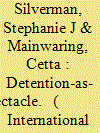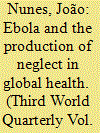| Srl | Item |
| 1 |
ID:
152727


|
|
|
|
|
| Summary/Abstract |
Using a combination of migration studies, political sociology, and policy studies, this paper explores the contradictions and violence of immigration detention, its architectures, and its audiences. The concept of “detention-as-spectacle” is developed to make sense of detention’s hypervisible and obscured manifestations in the European Union. We focus particularly on two case studies, the United Kingdom and Malta, which occupy different geopolitical positions within the EU. Detention-as-spectacle demonstrates that detention is less related to deterrence and security than to displaying sovereign enforcement, control, and power. A central aspect of the sovereign spectacle is detention’s purported ability to order and even halt “crises” of irregular immigration, while simultaneously creating and reinforcing these crises. The paper concludes by examining recent disruptions to the spectacle, and their implications.
|
|
|
|
|
|
|
|
|
|
|
|
|
|
|
|
| 2 |
ID:
144250


|
|
|
|
|
| Summary/Abstract |
This article argues that the 2014 Ebola outbreak in West Africa reinscribed the neglect that has surrounded this disease. The argument develops theoretical tools for understanding how neglect is produced in global health. Arguing that neglect is connected with the production of harm and vulnerability, it stresses the importance of emotions in issue-prioritisation in global health. Focusing on the dynamics of abjection, the article shows how the 2014 Ebola outbreak was framed as a (racialised) African problem and obfuscated by a political and media spectacle. The result was the preference for short-term crisis-management responses that detracted from long-term structural solutions.
|
|
|
|
|
|
|
|
|
|
|
|
|
|
|
|
| 3 |
ID:
101042


|
|
|
|
|
| Publication |
2010.
|
| Summary/Abstract |
At the height of the United States wars in Southeast Asia in the 1970s, while political violence wrecked the provinces, Bangkok became one of the most visible sites of violence in Thailand against leftist social movements. Drawing from an ethnography of commemoration and the military archive, I suggest that after thirty years of silence, current commemorations speak to how emotional engagements are maneuvered in the public arena into a politics of forgetting. At the same time, relatives of those killed by state violence and activists enact mourning practices to insist on loss and to challenge the state-sponsored celebrations of fallen heroes. Ultimately, Thai pasts are worked through these commemorations as "spectacular-time." As spectacle, the commemorations reenact the marches of the student movement as part of national history, to witness recreated scenes of violence, to relive particular landmarks as infused with meaning, and to identify with the alterity of 1970s leftist radicalism or the centrality of state manufactured democracy in Thailand.
|
|
|
|
|
|
|
|
|
|
|
|
|
|
|
|
| 4 |
ID:
144171


|
|
|
|
|
| Summary/Abstract |
India’s post-liberalisation landscape has unexpectedly been populated by monumental iconic statues. These statues, co-emergent with an automobile and construction boom and an attendant resignification and revaluing of land, are a productive site for rethinking the role of spectacle in neoliberal globalisation from the locus of post-liberalisation India. Against theories that characterise spectacle as primarily virtual and deterritorialised, they illuminate how spectacle is enmeshed in the imaginaries, spatial politics, material processes and heterogeneous temporalities of uneven development. Their religious aspect also calls for a re-examination of Benjamin’s distinction between cult value and exhibition value.
|
|
|
|
|
|
|
|
|
|
|
|
|
|
|
|
| 5 |
ID:
140132


|
|
|
|
|
| Summary/Abstract |
Globalisation and post-colonialism have created new religio-cultural geographies and articulations in many countries. Many aspects of Hindu religion have been transnationally stretched and (re)enacted within new migrant and diasporic spaces, in turn reshaping and somewhat changing how ritual and religious enactments come to be enunciated. This article focuses on the yajna as a plastic and symbolic resource that is enacted in a transnational context and within new idioms and vocabularies of religious expression. The article engages with Lubin’s (2001) thesis that the ‘public’ and visible aspect of yajna functions as a civic ‘spectacle’ and probes the performance element of this so-called ‘spectacle’, and looks at how it becomes re-ritualised and re-enacted to fit the contemporary needs of transnational and diasporic Hindu communities.
|
|
|
|
|
|
|
|
|
|
|
|
|
|
|
|